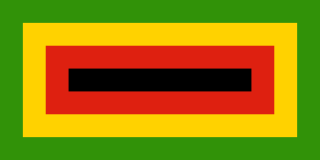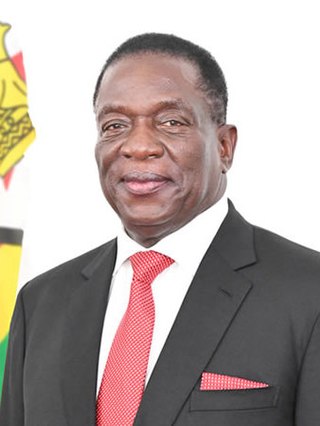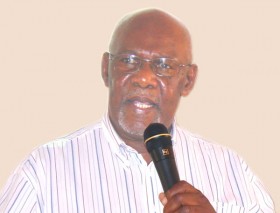
The Gukurahundi was a genocide in Zimbabwe which arose in 1982 until the Unity Accord in 1987. It derives from a Shona-language term which loosely translates to "the early rain which washes away the chaff before the spring rains".

The Zimbabwe African National Union – Patriotic Front (ZANU–PF) is a political organisation which has been the ruling party of Zimbabwe since independence in 1980. The party was led for many years under Robert Mugabe, first as prime minister with the Zimbabwe African National Union (ZANU) and then as president from 1987 after the merger with the Zimbabwe African People's Union (ZAPU) and retaining the name ZANU–PF, until 2017, when he was removed as leader.

The Zimbabwe African National Union (ZANU) was a militant socialist organisation that fought against white-minority rule in Rhodesia, formed as a split from the Zimbabwe African People's Union (ZAPU) in 1963. ZANU split in 1975 into wings loyal to Robert Mugabe and Ndabaningi Sithole, later respectively called ZANU–PF and ZANU–Ndonga. These two sub-divisions ran separately at the 1980 general election, where ZANU–PF has been in power ever since, and ZANU–Ndonga a minor opposition party.

Joshua Mqabuko Nyongolo Nkomo was a Zimbabwean revolutionary and politician who served as Vice-President of Zimbabwe from 1990 until his death in 1999. He founded and led the Zimbabwe African People's Union (ZAPU) from 1961 until it merged in 1987 with Robert Mugabe's Zimbabwe African National Union (ZANU) to form ZANU–PF after an internal military crackdown called Gukurahundi in western Zimbabwe, mostly on ethnic Ndebele ZAPU supporters.

The Rhodesian Bush War, also called the Second Chimurenga as well as the Zimbabwean War of Liberation, was a civil conflict from July 1964 to December 1979 in the unrecognised country of Rhodesia.

Zimbabwe People's Revolutionary Army (ZIPRA) was the military wing of the Zimbabwe African People's Union (ZAPU), a Marxist–Leninist political party in Rhodesia. It participated in the Rhodesian Bush War against white minority rule of Rhodesia. ZIPRA was formed during the 1960s by the nationalist leader Jason Moyo, the deputy of Joshua Nkomo.
Gibson Jama Sibanda was a Zimbabwean politician and trade unionist. He was a founding member of the Movement for Democratic Change and at the time of his death was the Vice-President of the faction of the Movement for Democratic Change led by Arthur Mutambara. A former president of the Zimbabwe Congress of Trade Unions, he was first elected to the House of Assembly in the 2000 parliamentary election. He was a member of the Senate and a Minister of State in the Office of Deputy Prime Minister Arthur Mutambara at the time of his death in 2010.

Emmerson Dambudzo Mnangagwa is a Zimbabwean politician who has served as President of Zimbabwe since 24 November 2017. A member of ZANU–PF and a longtime ally of former President Robert Mugabe, he held a series of cabinet portfolios and was Mugabe's Vice-President until November 2017, when he was dismissed before coming to power in a coup d'état. He secured his first full term as president in the disputed 2018 general election. Mnangagwa has been re-elected in 2023 with 52.6% of the votes. Nelson Chamisa came in second with 44%.

General elections were held in Southern Rhodesia between 14 February and 4 March 1980 to elect the members of the House of Assembly of the first Parliament of the independent Zimbabwe. As stipulated by the new Constitution of Zimbabwe produced by the Lancaster House Conference, the new House of Assembly was to comprise 100 members, 80 of whom would be elected proportionally by province by all adult citizens on a common role, and 20 of whom would be elected in single-member constituencies by whites on a separate roll.

Joseph Wilfred Msika, was a Zimbabwean politician who served as Second Vice-President of Zimbabwe from 1999 to 2009.
The Southern Rhodesia African National Congress (SRANC) was a political party active between 1957–1959 in Southern Rhodesia. Committed to the promotion of indigenous African welfare, it was the first fully fledged black nationalist organisation in the country. While short-lived — it was outlawed by the predominantly white minority government in 1959 — it marked the beginning of political action towards black majority rule in Southern Rhodesia, and was the original incarnation of the National Democratic Party (NDP); the Zimbabwe African People's Union (ZAPU); the Zimbabwe African National Union (ZANU); and the Zimbabwe African National Union — Patriotic Front (ZANU–PF), which has governed Zimbabwe continuously since 1980. Many political figures who later became prominent, including Robert Mugabe and Joshua Nkomo, were members of the SRANC.

Dumiso Dabengwa was a Zimbabwean politician. He served as the head of Zimbabwe People's Revolutionary Army (ZIPRA) intelligence during the Rhodesian Bush War.
Lieutenant General Lookout Khalisabantu Vumindaba Masuku commanded the Zimbabwe People's Revolutionary Army (ZIPRA), the militant wing of the Zimbabwe African People's Union (ZAPU), during the Rhodesian Bush War. He served as the deputy commander of the Zimbabwe National Army until his arrest in 1982 for allegedly plotting to overthrow President Robert Mugabe.
Nathan Shamuyarira was a Zimbabwean nationalist who at different times fought on behalf of and helped lead FROLIZI, ZANU, and ZAPU. He later served as the Information Minister of Zimbabwe and as the Information Secretary of ZANU PF. He was writing President Robert Mugabe's biography at the time of his death.
Zimbabwe regained its independence from the United Kingdom on 17 April 1980. Canaan Banana, a Methodist minister and theologian, became the first President of Zimbabwe on 18 April.
The Zimbabwe African People's Union – Federal Party is a minor Zimbabwean political party, based in Matabeleland. ZAPU-FP split from Agrippa Madlela's ZAPU party, purportedly a revival of those members of ZAPU who had rejected the 1987 merger with ZANU-PF in January 2002, following attempts by a faction of ZAPU led by Agrippa Madlela not to contest the Zimbabwean presidential election, 2002 a ZAPU founder Paul Siwela, was seconded to run as ZAPU's presidential candidate but was blocked by Aggripa Madlela's faction which itself was accused of accepting payments from the MDC which feared that ZAPU's participation in the election would split the anti-Mugabe vote in Matabeleland.
Moses Mzila Ndlovu is a Zimbabwean legislator and veteran of the 1970s liberation war. He is also a retired teacher and a member of the House of Assembly representing Bulilima West (MDC-M).

General elections were held in Zimbabwe on 31 July 2013. Incumbent President Robert Mugabe was re-elected, whilst his ZANU–PF party won a two-thirds majority in the National Assembly.
The 1981 Entumbane uprising, also known as the Battle of Bulawayo or Entumbane II, occurred between 8 and 12 February 1981 in and around Bulawayo, Zimbabwe amid political tensions in the newly independent state. Zimbabwe People's Revolutionary Army (ZIPRA) guerrillas, mainly in the city's western suburb of Entumbane, rebelled, creating a situation that threatened to develop into a fresh civil war, barely a year after the end of the Bush War. The Rhodesian African Rifles (RAR) and other white-commanded elements of the former Rhodesian Security Forces, fighting for the Zimbabwean government as part of the new Zimbabwe National Army, put down the uprising. Groups of Zimbabwe African National Liberation Army (ZANLA) fighters attacked both ZIPRA and the government forces during the revolt, which followed a smaller outbreak of fighting between guerrillas in November 1980.











